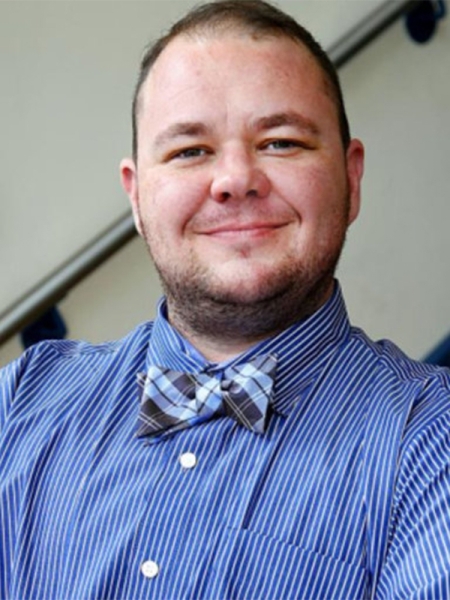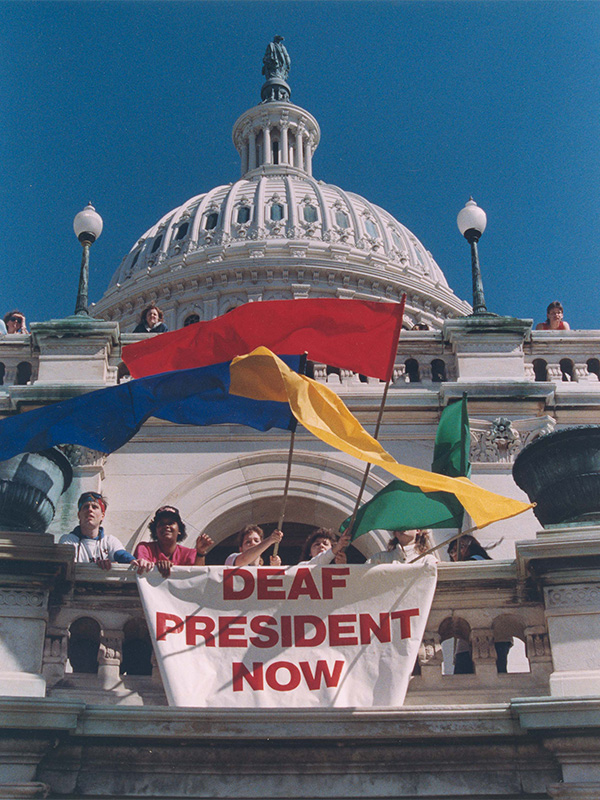Presented in collaboration with Penn’s ASL Program
In 1988, the Gallaudet University community protested the hiring of a hearing person as the newly-appointed president of the prestigious institution, which had always been dedicated to providing a fully accessible linguistic environment for deaf and hard-of-hearing people. Gallaudet hadn’t had a deaf president in its 124 year history and the politics of the protest and disability rights reverberated across the globe with front-page headlines and primetime news interviews. In the three and half decades since the Deaf President Now movement, deaf people continue to occupy a liminal space between the margins and the center of popular imagination as sign languages became vogue.
 Octavian Robinson is associate professor of Deaf Studies at Gallaudet University. He earned his Ph.D. in Modern U.S. history with specializations in women/gender, African-American, and disability. Although trained as a historian at The Ohio State University, he situates himself as an interdisciplinary disability studies scholar with an emphasis on deaf-related questions. As a deaf disabled scholar, his work takes on three major threads: attitudes toward signed languages and disability languaging, the politics of accessibility vis a vis signed language interpreting, and ableist rhetoric in deaf discourses. He is particularly interested in how and why deaf people deployed respectability politics during the early twentieth century to separate themselves from people with other disabilities.
Octavian Robinson is associate professor of Deaf Studies at Gallaudet University. He earned his Ph.D. in Modern U.S. history with specializations in women/gender, African-American, and disability. Although trained as a historian at The Ohio State University, he situates himself as an interdisciplinary disability studies scholar with an emphasis on deaf-related questions. As a deaf disabled scholar, his work takes on three major threads: attitudes toward signed languages and disability languaging, the politics of accessibility vis a vis signed language interpreting, and ableist rhetoric in deaf discourses. He is particularly interested in how and why deaf people deployed respectability politics during the early twentieth century to separate themselves from people with other disabilities.
With his colleague Jon Henner, Robinson recently began a movement in linguistics with their 2021 preprint, “Unsettling languages, Unruly bodyminds: A Crip Linguistics Manifesto,” which was formally published in 2023. Crip linguistics challenges those working in language-related fields to interrogate their attitudes about disability, challenge the exclusion of disabled ways of languaging from linguistics research and applied practice, and contest ideas about “broken” languaging. This framework has begun a revolution in linguistics and related fields in how linguists and practitioners talk about the ways that people language. The manifesto is now being parlayed into a multidisciplinary anthology on crip linguistics with Gallaudet University Press. Beyond crip linguistics, he is also writing a monograph on neoliberalism in twentieth century deaf political discourse and a critical reading of contemporary deaf rhetoric through queer theoretical frameworks. Prior to his current position at Gallaudet University, he held an appointment as Assistant Professor of Deaf Studies at College of the Holy Cross. He has a B.A. in history and a M.A. in Deaf Studies from Gallaudet University.




